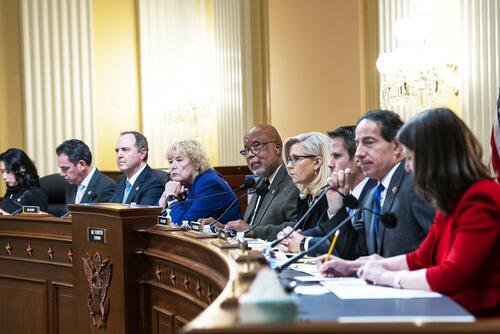
Below is my column in The Hill on issuance of a subpoena for former President Donald J. Trump by the January 6th Select Committee. It brought to together two obsessions: the Bears and the law. The final scheduled play in both the Bears game and the Committee hearings had one striking similarity. In both cases, the throw was solid but it came too late and the reception was much in doubt.
Here is the column:
Two events consumed Washington on Thursday. The hapless Commanders won a game against the Chicago Bears — and the House Select Committee on Jan. 6 issued a subpoena to former President Trump.
The attempted touchdown pass and the subpoena share one obvious feature: No matter how exciting the play, they came too late. The Bears threw what appeared to be a touchdown pass in the final seconds … only to lose due to a fall out of the endzone. The House Committee issued a subpoena after its last scheduled hearing and shortly before its likely cessation as a committee.
Yet, even for the long-suffering Bears fans, we knew when the game was over. The House committee and its supporters seemed unaware or unconcerned that its play came too late. Instead, they insisted that issuing a subpoena more than a year too late was all logical and strategic.
It is unclear if Trump will contest the subpoena, but he has contested virtually every previous subpoena in civil and criminal cases. The committee has, in my view, a solid case to compel him to testify. However, it had that case back at its creation on July 1, 2021; it simply waited until a subpoena may be impossible to enforce.
In football, they would be flagged for an “intentional grounding” for throwing a ball where there was no viable receiver or “a realistic chance of completion.”
Two points were immediately emphasized by the committee and its supporters in the media.
-
First, some of the coverage highlighted that this was “unanimous” without recognizing the irony of that distinction. House Democrats barred two Republican members originally selected by GOP leaders, who then boycotted the panel in response. There is no indication the committee, hand-picked by Speaker Nancy Pelosi (D-Calif.), has ever had anything but unanimous votes. The only thing its members can cite for not being yes-men is that when there were demands for greater balance in witnesses or questioning, they all said “no.”
-
The second point is even more telling: The committee has precedent for former presidents being subpoenaed, such as Harry Truman — but that example is hardly helpful. Truman was subpoenaed by one of the most notorious panels in the history of Congress, the House Un-American Activities Committee, which was ridiculed for its lack of balance and due process.
While called “historic,” former presidents have been subpoenaed before, though it remains exceptionally rare. It is even more rare for them to testify. Truman never did; when Congress subpoenaed former presidents John Tyler and John Quincy Adams over the alleged misuse of funds, Tyler appeared but Adams submitted a deposition. Others, such as Bill Clinton, were subpoenaed to appear in civil cases or subpoenaed for documents, such as Richard Nixon.
The Jan. 6 committee had a noble mandate but failed to use it to offer a credible investigation for citizens across the political spectrum. From the first to the final hearing, it presented a one-sided narrative in a tightly scripted, packaged production. No defense or alternative explanations for key events or statements were allowed; witnesses were largely asked specific questions to get them to repeat what they said in previously recorded interviews, as members read from a teleprompter.
The committee could have been so much more. It could have followed the type of balanced inquiry that pursued allegations tied to the Pearl Harbor attack or Watergate. Even without Republican-appointed members, it could have insisted on balanced hearings with witnesses and dissenting views.
Nevertheless, the committee revealed important, often disturbing details. It was important for Americans to hear from figures like former attorney general Bill Barr and White House lawyers who struggled to counter unfounded advice given to Trump by outside lawyers on challenging the 2020 election. There were painful scenes of Capitol police overwhelmed at barricades and members of Congress hunkered down in offices.
Yet, the focus on a single approved narrative gave the hearings the feel of an infomercial selling a product that most of us bought two years earlier.
Subpoenaing Trump on the final scheduled hearing only reaffirmed how the committee was driven by political rather than investigative priorities. Indeed, the timing was embarrassingly transparent. While Trump could appear without a challenge or the Democrats could retain the House, few experts are predicting either outcome.
For more than a year, the committee said its investigation was focused on Trump’s intent and actions. Chairman Bennie Thompson (D-Miss.) explained that the subpoena was essential because “he must be accountable. He is required to answer for his actions on Jan. 6. So we want to hear from him.” Why, then, wait until the last hearing, especially if the House may flip to GOP control in a matter of weeks?
It seemed another case of planned obsolescence by the House leadership. In the first Trump impeachment, Speaker Pelosi imposed an arbitrary deadline for impeachment by Christmas. That deadline was then used as an excuse to hold only one hearing on the legal standard with only one Republican witness. (I was that sole witness.) This was reportedly ordered over the objections of House Judiciary Chairman Jerry Nadler (D-N.Y.) who raised the abandonment of both due process and precedent. Pelosi then delayed transmitting the impeachment articles to the Senate — destroying her own rationalization for the lack of hearings.
In the second Trump impeachment, Pelosi went one better: She ordered a “snap impeachment” that dispensed entirely with hearings and witnesses.
If Trump declines to appear before the committee on constitutional grounds, the House would likely run out of time for any challenge.
Thus, the only way to enforce this subpoena in time would be a “snap contempt” vote that does not wait for negotiation or judicial review.
Attorney General Merrick Garland also would have to move at a record pace to prosecute Trump before Republicans can retake the House and rescind a contempt sanction. Garland could argue that he should be allowed to prosecute Trump based on the original vote, but the House is the putative victim in the case — and we could have the victim claiming not to be a victim as the Justice Department prosecutes its victimization.
That brings us back to what the House can learn from the Chicago Bears. This was only the latest game lost in the final seconds due to bungled plays. However, we do recognize when the game ends.
Not so with the House team. If the committee truly wanted to compel Trump’s testimony, it should have subpoenaed him in 2021. Yet liberals celebrated the committee’s belated move as a “bombshell ending” instead of asking why it had not been a bombshell beginning.
As Bears fans, we are often chided for being delusional in our hope for each new season — a blind faith that reaches almost pathological levels with each successive Cubs season. But we cannot hold a candle to fans of the Jan. 6 committee, who just wildly applauded a Hail Mary pass to an effectively empty field after the last hearing and before the team is likely to be disbanded. And those fans remain cheering a legal throw after the last hearing and just before the team is likely to be disbanded by new management.
Now that’s a fan base.
Below is my column in The Hill on issuance of a subpoena for former President Donald J. Trump by the January 6th Select Committee. It brought to together two obsessions: the Bears and the law. The final scheduled play in both the Bears game and the Committee hearings had one striking similarity. In both cases, the throw was solid but it came too late and the reception was much in doubt.
Here is the column:
Two events consumed Washington on Thursday. The hapless Commanders won a game against the Chicago Bears — and the House Select Committee on Jan. 6 issued a subpoena to former President Trump.
The attempted touchdown pass and the subpoena share one obvious feature: No matter how exciting the play, they came too late. The Bears threw what appeared to be a touchdown pass in the final seconds … only to lose due to a fall out of the endzone. The House Committee issued a subpoena after its last scheduled hearing and shortly before its likely cessation as a committee.
Yet, even for the long-suffering Bears fans, we knew when the game was over. The House committee and its supporters seemed unaware or unconcerned that its play came too late. Instead, they insisted that issuing a subpoena more than a year too late was all logical and strategic.
It is unclear if Trump will contest the subpoena, but he has contested virtually every previous subpoena in civil and criminal cases. The committee has, in my view, a solid case to compel him to testify. However, it had that case back at its creation on July 1, 2021; it simply waited until a subpoena may be impossible to enforce.
In football, they would be flagged for an “intentional grounding” for throwing a ball where there was no viable receiver or “a realistic chance of completion.”
Two points were immediately emphasized by the committee and its supporters in the media.
-
First, some of the coverage highlighted that this was “unanimous” without recognizing the irony of that distinction. House Democrats barred two Republican members originally selected by GOP leaders, who then boycotted the panel in response. There is no indication the committee, hand-picked by Speaker Nancy Pelosi (D-Calif.), has ever had anything but unanimous votes. The only thing its members can cite for not being yes-men is that when there were demands for greater balance in witnesses or questioning, they all said “no.”
-
The second point is even more telling: The committee has precedent for former presidents being subpoenaed, such as Harry Truman — but that example is hardly helpful. Truman was subpoenaed by one of the most notorious panels in the history of Congress, the House Un-American Activities Committee, which was ridiculed for its lack of balance and due process.
While called “historic,” former presidents have been subpoenaed before, though it remains exceptionally rare. It is even more rare for them to testify. Truman never did; when Congress subpoenaed former presidents John Tyler and John Quincy Adams over the alleged misuse of funds, Tyler appeared but Adams submitted a deposition. Others, such as Bill Clinton, were subpoenaed to appear in civil cases or subpoenaed for documents, such as Richard Nixon.
The Jan. 6 committee had a noble mandate but failed to use it to offer a credible investigation for citizens across the political spectrum. From the first to the final hearing, it presented a one-sided narrative in a tightly scripted, packaged production. No defense or alternative explanations for key events or statements were allowed; witnesses were largely asked specific questions to get them to repeat what they said in previously recorded interviews, as members read from a teleprompter.
The committee could have been so much more. It could have followed the type of balanced inquiry that pursued allegations tied to the Pearl Harbor attack or Watergate. Even without Republican-appointed members, it could have insisted on balanced hearings with witnesses and dissenting views.
Nevertheless, the committee revealed important, often disturbing details. It was important for Americans to hear from figures like former attorney general Bill Barr and White House lawyers who struggled to counter unfounded advice given to Trump by outside lawyers on challenging the 2020 election. There were painful scenes of Capitol police overwhelmed at barricades and members of Congress hunkered down in offices.
Yet, the focus on a single approved narrative gave the hearings the feel of an infomercial selling a product that most of us bought two years earlier.
Subpoenaing Trump on the final scheduled hearing only reaffirmed how the committee was driven by political rather than investigative priorities. Indeed, the timing was embarrassingly transparent. While Trump could appear without a challenge or the Democrats could retain the House, few experts are predicting either outcome.
For more than a year, the committee said its investigation was focused on Trump’s intent and actions. Chairman Bennie Thompson (D-Miss.) explained that the subpoena was essential because “he must be accountable. He is required to answer for his actions on Jan. 6. So we want to hear from him.” Why, then, wait until the last hearing, especially if the House may flip to GOP control in a matter of weeks?
It seemed another case of planned obsolescence by the House leadership. In the first Trump impeachment, Speaker Pelosi imposed an arbitrary deadline for impeachment by Christmas. That deadline was then used as an excuse to hold only one hearing on the legal standard with only one Republican witness. (I was that sole witness.) This was reportedly ordered over the objections of House Judiciary Chairman Jerry Nadler (D-N.Y.) who raised the abandonment of both due process and precedent. Pelosi then delayed transmitting the impeachment articles to the Senate — destroying her own rationalization for the lack of hearings.
In the second Trump impeachment, Pelosi went one better: She ordered a “snap impeachment” that dispensed entirely with hearings and witnesses.
If Trump declines to appear before the committee on constitutional grounds, the House would likely run out of time for any challenge.
Thus, the only way to enforce this subpoena in time would be a “snap contempt” vote that does not wait for negotiation or judicial review.
Attorney General Merrick Garland also would have to move at a record pace to prosecute Trump before Republicans can retake the House and rescind a contempt sanction. Garland could argue that he should be allowed to prosecute Trump based on the original vote, but the House is the putative victim in the case — and we could have the victim claiming not to be a victim as the Justice Department prosecutes its victimization.
That brings us back to what the House can learn from the Chicago Bears. This was only the latest game lost in the final seconds due to bungled plays. However, we do recognize when the game ends.
Not so with the House team. If the committee truly wanted to compel Trump’s testimony, it should have subpoenaed him in 2021. Yet liberals celebrated the committee’s belated move as a “bombshell ending” instead of asking why it had not been a bombshell beginning.
As Bears fans, we are often chided for being delusional in our hope for each new season — a blind faith that reaches almost pathological levels with each successive Cubs season. But we cannot hold a candle to fans of the Jan. 6 committee, who just wildly applauded a Hail Mary pass to an effectively empty field after the last hearing and before the team is likely to be disbanded. And those fans remain cheering a legal throw after the last hearing and just before the team is likely to be disbanded by new management.
Now that’s a fan base.







